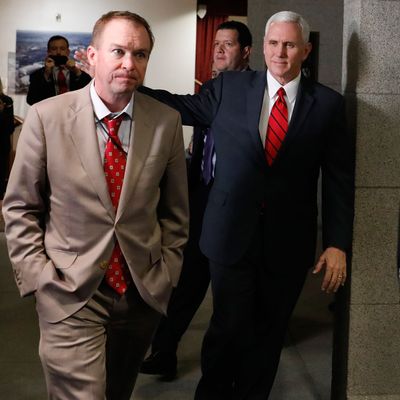
There are many reasons why Republicans pulled the plug on President Trump’s first health-care bill without even giving it a vote. To name the big ones:
1) The Republican Party’s objections to Obamacare are radically different from those of the general public. The GOP hated the law because it raised taxes on millionaire investors to subsidize the medical expenses of the poor, sick, and elderly (and, also because a black, Democratic president passed it). Much of the public disliked the law because its subsidies were not generous enough to make insurance truly affordable for many Americans (and/or because a black, Democratic president passed it).
The GOP was aware of this discrepancy, which is why it did everything it could to focus attention on the black-president part — and then, when Barack Obama left the scene, pretended that their problem with his health-care law was that it didn’t do enough to lower deductibles and the rate of the uninsured. But since their actual policy goal was to cut subsidies (and, thus, increase deductibles and the uninsured rate) to finance a tax cut for the rich, they couldn’t help but produce a bill that made what they claimed to hate about Obamacare worse.
2) They tried to rush through a major structural reform to one-sixth of the American economy in 17 days, composing much of the legislation without the benefit of a score from the Congressional Budget Office.
3) The House GOP leadership managed to design a system of health insurance subsidies so flawed, it would actually leave more people uninsured than if you just repealed Obamacare without a replacement.
4) To get the House’s hard-liners onboard, the White House offered changes that would have made the bill dead on arrival in the Senate for reasons both ideological and procedural (you probably can’t scrap Obamacare regulations through a budget-reconciliation bill).
5) Even after those changes, Trumpcare remained too left-wing for the House Freedom Caucus, and too right-wing for the (relatively) moderate Republicans of the Tuesday Group. This made finding a happy middle ground between the two factions impossible.
These problems were prominently featured in the countless autopsies that followed the bill’s demise. All of them are pretty straightforward and easy to understand.
And yet, the White House apparently convinced itself that the only thing wrong with their approach to health-care reform was that they let Paul Ryan take the lead instead of Mike Pence.
This week, the Trump administration facilitated talks between the House GOP’s moderate and conservative factions, with the hope of drafting a new Obamacare-repeal plan, and bringing it to a vote by Friday — thereby sparing Republican lawmakers from having to return to their districts for the April recess empty-handed.
To pull this off, the White House reportedly sought to win over the Freedom Caucus by allowing states to opt out of Obamacare’s Essential Health Benefits rule, which requires insurers to cover a set of basic health-care services including maternity care, mental health, and prescription drugs. Additionally, Vice-President Pence led the tea-party hardliners to believe that the new bill would also let states waive Obamacare’s community ratings rule, which bars insurers from charging exorbitant premiums to people with preexisting conditions. Together, these provisions would return many of America’s nonaffluent cancer patients to the pre-Obamacare status quo — leaving them to chose between bankruptcy and death.
In other words: After reflecting on the lessons of Trumpcare 1.0’s failure, the White House decided that this time it would try to pass a version of health-care reform that would do the opposite of what Republicans had promised by appeasing the House’s hard-liners with changes that would make the bill D.O.A. in the Senate, doing nothing to address the flaws in the bill’s subsidy system, and giving itself a five-day deadline to push a major structural reform to one-sixth of the American economy through the House, leaving lawmakers to vote without any guidance from the CBO.
As for the inescapable divide between the House’s moderates and conservatives, the White House hoped leaving controversial issues up to the states would work. And, when that didn’t, Pence apparently tried to bridge the chasm with a clever little legislative maneuver that D.C. insiders call “lying.” As Politico reports:
Pence told hard-line Freedom Caucus members Monday night that changes to the bill would allow governors to opt out of Obamacare’s “community rating” provision, which prohibits insurers from charging higher premiums to people who are sick, are older or based on their gender. Without it, insurers could charge more to people with cancer or other medical conditions, though supporters say it would drive down premiums for healthy people.
Meadows said they were told governors would be allowed to opt out for “all community ratings with the exception of gender.” But moderate GOP members who met with Pence the same day say they were under the impression that governors would only receive “community rating” flexibility based on a person’s age — not their illness or other factors. They argue the “community rating” provision goes hand-in-hand with Obamacare regulations that bar insurance companies from rejecting people with pre-existing conditions — and that without it, the pre-existing conditions protections are meaningless because insurance companies could price sick people out of the market by charging them exorbitant premiums.
That’s not the only discrepancy. Some Freedom Caucus members say the White House also floated the idea of letting governors opt out of the law’s “guarantee issue,” which bars insurance companies from turning away sick people…But that’s not at all what centrists said they heard from Pence.
Even if Pence was telling the Freedom Caucus the truth, some of its hard-liners still wouldn’t be satisfied.
“The federal government is the big boss and we may throw some crumbs to the states,” Texas congressman Louie Gohmert complained to reporters. “The states shouldn’t have to ask the federal government for waivers. The federal government should have to ask states for permission.”
Now, Zombie Trumpcare is staggering back to its grave; House Republicans will spend their vacations being chewed out by constituents who wanted to see Obamacare repealed (and by those that didn’t); the president has once again undermined his reputation as a deal maker; and when GOP lawmakers return to Capitol Hill after Easter, they’ll have one week to avert a government shutdown.
The Republicans must be so sick of winning.






























